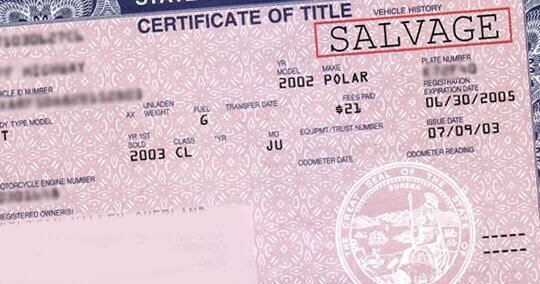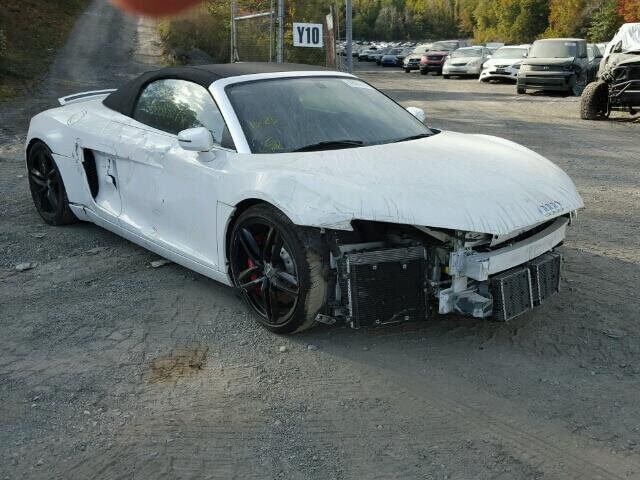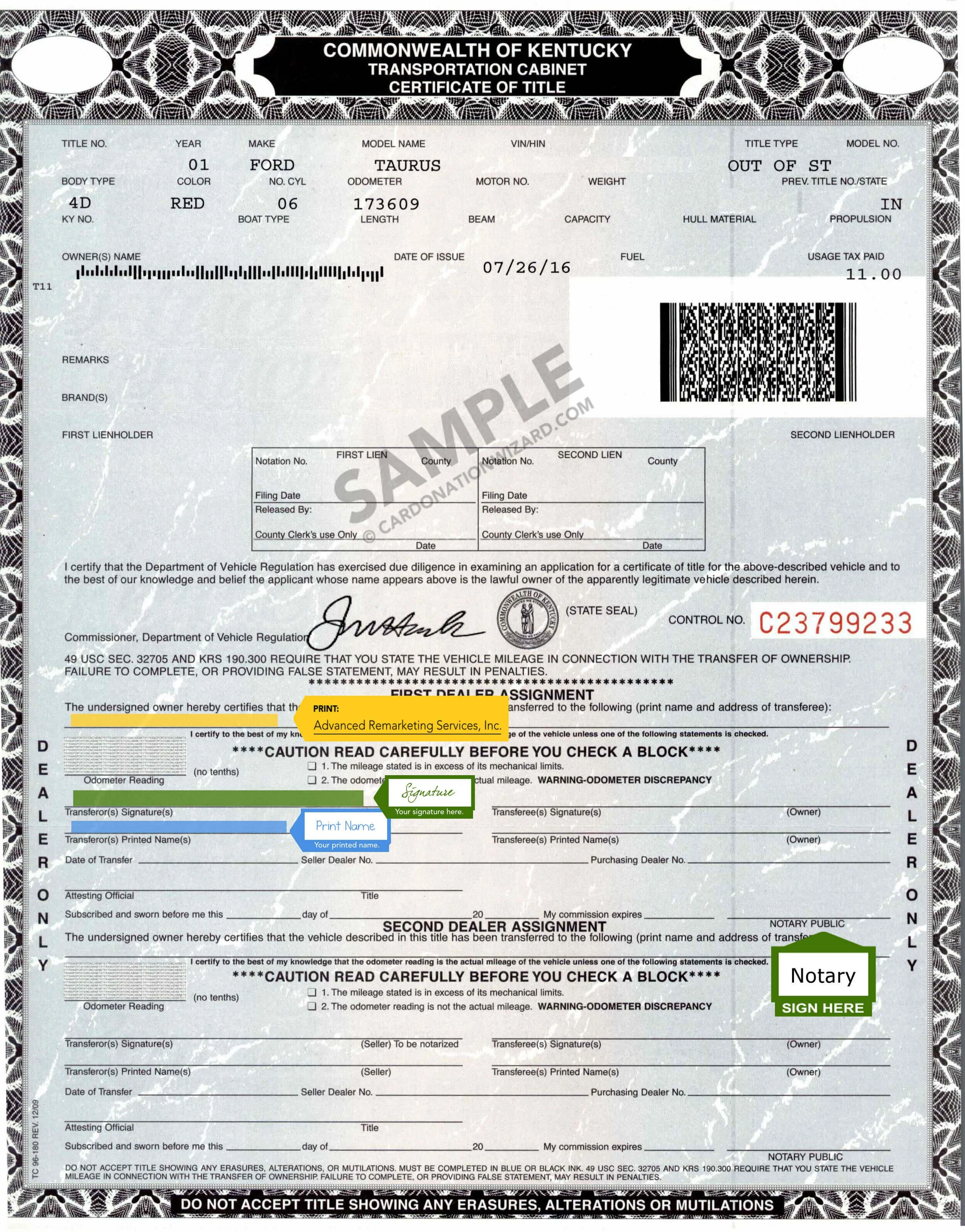We have people ask us all the time, “Should I buy a vehicle with a salvage title?” Our answer is based on specific details. It’s important to understand the differences between salvage titles, prior salvage titles, and rebuilt titles. Problems can arise because some states define these terms differently than others, so today we're going to talk about salvage and rebuilt titles to determine whether you should buy a car with a salvage title.
You can legally insure a car with a salvage title. A salvage title can be issued for many reasons. The vehicle may have been repaired since the accident or there may have been no accident at all.
A surprise salvage history could cause a vehicle to lose up to 40% of its value; knowing about it beforehand could save you from making a bad purchase.
Let’s start from the start:
How to Spot a Salvage Title
Salvage titles almost always reduce the value of a vehicle but the specific reason behind the salvage title is usually more important. The car could have experienced a serious accident or no accident at all.
It’s easy to spot a salvage title – it’s often clearly marked on the front as in the example below. It will also show up on VIN Checks. This service will explain the timing and reason behind a salvage title.
It’s important to research a salvage title because:
Independent repair shops don’t always use OEM-quality parts
The seller may not know the entire story
The car’s longevity may be compromised
Get peace of mind by learning the reason behind your car’s salvage title. See our Services to learn more.
What Does a Salvage Title Mean?
In the United States, a salvage title is issued to indicate that an insurance company has previously deemed the vehicle a total loss. A salvage title can be issued due to a collision, theft, abandonment, vandalization, or weather events such as hail or flooding. Insurance providers are legally required to apply for a salvage title once damage exceeds a certain percentage of the vehicle’s value.
Quick facts about salvage titles:
A car cannot be “salvaged” multiple times
A salvage title can never be made clean again
Insurance will not total the same car more than once
Prior salvage vehicles may be subject to limited insurance coverage
Each state has a different salvage title threshold, and that can cause problems for future buyers.
Example only. Figures accurate at the time of publishing of the data source.
How Is a Salvage Status Determined?
If the cost to repair a vehicle meets or exceeds a certain percentage of its overall value prior to the loss, the vehicle will be assigned a salvage title. The change might only become visible on the title the next time the vehicle is registered.
Some states operate on a Total Loss Formula. For a salvage title to be issued using a Total Loss Formula the vehicle’s value prior to the loss must be equaled by the combined cost of repairs and post-accident scrap value. This approach evaluates each vehicle individually, so mileage, modifications, and overall condition will have a greater effect on the outcome than in other states.
The problem: A vehicle could be sold in a state with a different salvage threshold than where it originally received its salvage branding.
Let’s look at these problems in greater detail.
The Dangers of Buying a Car with a Salvage Title
Damage could go unnoticed. In some states, a vehicle could sustain damage totaling 99.9% of its market value and not be required to carry a salvage title even though that same car would carry a salvage title if the damage happened in another state. If the seller then chose to hide that information and the buyer failed to investigate further, botched or incomplete repairs could go unnoticed.
Damage could be exaggerated. Conversely, based on the data above an Iowan, Nevadan, or Oklahoman could be involved in a far less serious accident yet they would be assigned a salvage title. This would greatly reduce the car’s value even though the car wouldn’t have been deemed a total loss had the accident happened in a surrounding state.
In recent years, two states have featured a salvage threshold of 100% and three have seen a threshold of less than 70%. In Iowa, a minor accident could have easily cause a vehicle to carry a salvage title branding.
These differences could result in cars being issued salvage titles in a state like Iowa for something that would not have been serious enough to warrant a salvage title in a different state, skewing the picture and damaging the car’s resale value. Conversely, a car could be severely damaged in a state that doesn’t issue salvage titles until a very high threshold has been met, allowing sellers to gloss over the truth.
What’s more, someone could move a title from one state to another and alter its status in the process. The process of altering a car’s title status is called title washing. This scam is more common than car theft and affects millions of cars in the United States. It’s highly illegal – in fact, it’s a federal offense. The effects of this fraud are severe.
Confused by why it works this way? Don’t worry, everyone is.
Salvage Titles Aren’t Always Bad
Since it’s possible for a vehicle to be branded salvage without taking any damage, a salvage title may be nothing to worry about. The damage could have been purely cosmetic; a motorcycle can often be deemed a total loss after simply being dropped on its side.
Salvaged cars are usually much cheaper than their clean-title counterparts, and if you’re looking for a project or have technical know-how you could save lots of money on your next car. Just be sure to keep that value in mind when you resell the car.
What is a Rebuilt Title? What is a Prior Salvage Title?
Once a salvage vehicle has been repaired it must be inspected by a state agency (commonly the Highway Patrol) before being used on public roads again. The state will then issue a rebuilt or prior salvage title to designate that while the vehicle is presently roadworthy it was once deemed a total loss. It will be labeled right on the title. Not every state does it this way and some states don’t do it at all.
Even if a vehicle has been repaired and a rebuilt title has been issued, insurance companies may only offer reduced coverages.
A salvage, prior salvage, or rebuilt title is a serious thing that shouldn’t be taken lightly, no matter what the seller says.
Trust People at Church, Not on Craigslist
Yeah, I’m throwing shade. It doesn’t matter what the seller tells you about their car’s salvage title, you need to do your own research. You wouldn’t believe what people will do to make a dollar these days… things that make covering up a car’s history look like a walk in the park. Even if they’re being truthful the seriousness of the damage may not be known even to them; phrases like “it wasn’t that bad” or “it was just cosmetic” are completely subjective and don’t explain anything.
This seller does not mention the title status in the description. I wonder why?
Not only are private sellers to blame, dealerships have been known to hide title histories by obtaining false titles. Some dealers even claim they can magically “turn a salvage title into a clean title.” They can’t (not legally, anyway).
When investigating a salvage title, a buyer should take the same precautions as they would with a potentially stolen vehicle. A VIN Check will reveal the truth about the title’s history. If the seller objects to these measures or won’t reveal the car’s VIN number, they probably have something to hide. Walk away and don’t look back.
What Precautions Can I Take?
The best thing you can do is to always check the vehicle’s VIN and history before making a purchase.
Run the car’s history. We offer VIN Checks on our site to help you make the best car buying decision possible. Those services will reveal details surrounding the issuance of a salvage title and any other accidents on record, plus other useful details including elements of the car’s service history when applicable.
Get a Pre-Purchase Inspection. Professional mechanics can spot repairs that may not be obvious to the untrained eye. Even if you’re car savvy, it’s best to have a shop or repair facility do a Pre-Purchase Inspection on any vehicle you get serious about buying.
If you have any questions about the VIN Check process or titles in general, please don’t hesitate to contact us and we’ll be glad to help.
The best tool is education: check out the related articles below for more information on car titles.
We are not attorneys. This article is not legal advice.



















Selling a vehicle that's registered in a Montana LLC may seem complex, but it's actually a straightforward process. Whether you plan to sell the vehicle on its own or include the LLC in the transaction, there are several advantages to consider. From avoiding sales tax to making the transition easier for the buyer, a Montana LLC can streamline the sale. This article walks you through the steps, legal considerations, and best practices for successfully selling your vehicle, while also helping you decide whether to keep or transfer your LLC.